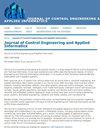Prediction-based Optimization of Service Capacity with Robotic Process Automation
IF 0.6
4区 计算机科学
Q4 AUTOMATION & CONTROL SYSTEMS
引用次数: 0
Abstract
The research described in this paper concerns the automation of back-office workflows for the capacity management of hospitality services: continuously monitoring clients’ reservations and hotel registrations and automatically updating the decisions that establish optimal staffing levels to assure dependable and accurate services with minimum personnel cost, and maintaining a minimal stable workforce level. The service capacity management workflows connect multiple instances of online reservation and front-office customer registration processes (booking, check-in taxation, check-out invoicing according to the back-office strategy) with a combination of marketing- and operations-oriented back-office processes that: a) best match capacity and demand for quality services, and b) optimize the staffing levels and personnel workshift schedules. These workflows with many operations and complex timing are automated with the Robotic Process Automation (RPA) technology that uses AI techniques for seasonality prediction of confirmed service demand. A case study of optimal hotel staff assignment with RPA using the Blue Prism scheduler is included, and the gains of using RPA solutions are presented. DOI: 10.61416/ceai.v25i2.8439基于机器人过程自动化的服务能力预测优化
本文中描述的研究涉及酒店服务容量管理的后台工作流程自动化:持续监控客户的预订和酒店注册,自动更新决策,建立最佳人员配备水平,以确保以最小的人员成本提供可靠和准确的服务,并保持最低的稳定劳动力水平。服务容量管理工作流将在线预订和前台客户注册流程的多个实例(根据后台策略预订、入住税务、退房发票)与面向营销和运营的后台流程的组合连接起来,这些流程包括:a)最好地匹配容量和对优质服务的需求,b)优化人员配备水平和人员轮班时间表。这些具有许多操作和复杂时间的工作流程通过机器人过程自动化(RPA)技术实现自动化,该技术使用人工智能技术对已确认的服务需求进行季节性预测。本文介绍了一个使用Blue Prism调度器的RPA优化酒店员工分配的案例研究,并介绍了使用RPA解决方案的好处。DOI: 10.61416 / ceai.v25i2.8439
本文章由计算机程序翻译,如有差异,请以英文原文为准。
求助全文
约1分钟内获得全文
求助全文
来源期刊
CiteScore
1.50
自引率
22.20%
发文量
0
审稿时长
6 months
期刊介绍:
The Journal is promoting theoretical and practical results in a large research field of Control Engineering and Technical Informatics. It has been published since 1999 under the Romanian Society of Control Engineering and Technical Informatics coordination, in its quality of IFAC Romanian National Member Organization and it appears quarterly.
Each issue has up to 12 papers from various areas such as control theory, computer engineering, and applied informatics. Basic topics included in our Journal since 1999 have been time-invariant control systems, including robustness, stability, time delay aspects; advanced control strategies, including adaptive, predictive, nonlinear, intelligent, multi-model techniques; intelligent control techniques such as fuzzy, neural, genetic algorithms, and expert systems; and discrete event and hybrid systems, networks and embedded systems. Application areas covered have been environmental engineering, power systems, biomedical engineering, industrial and mobile robotics, and manufacturing.

 求助内容:
求助内容: 应助结果提醒方式:
应助结果提醒方式:


